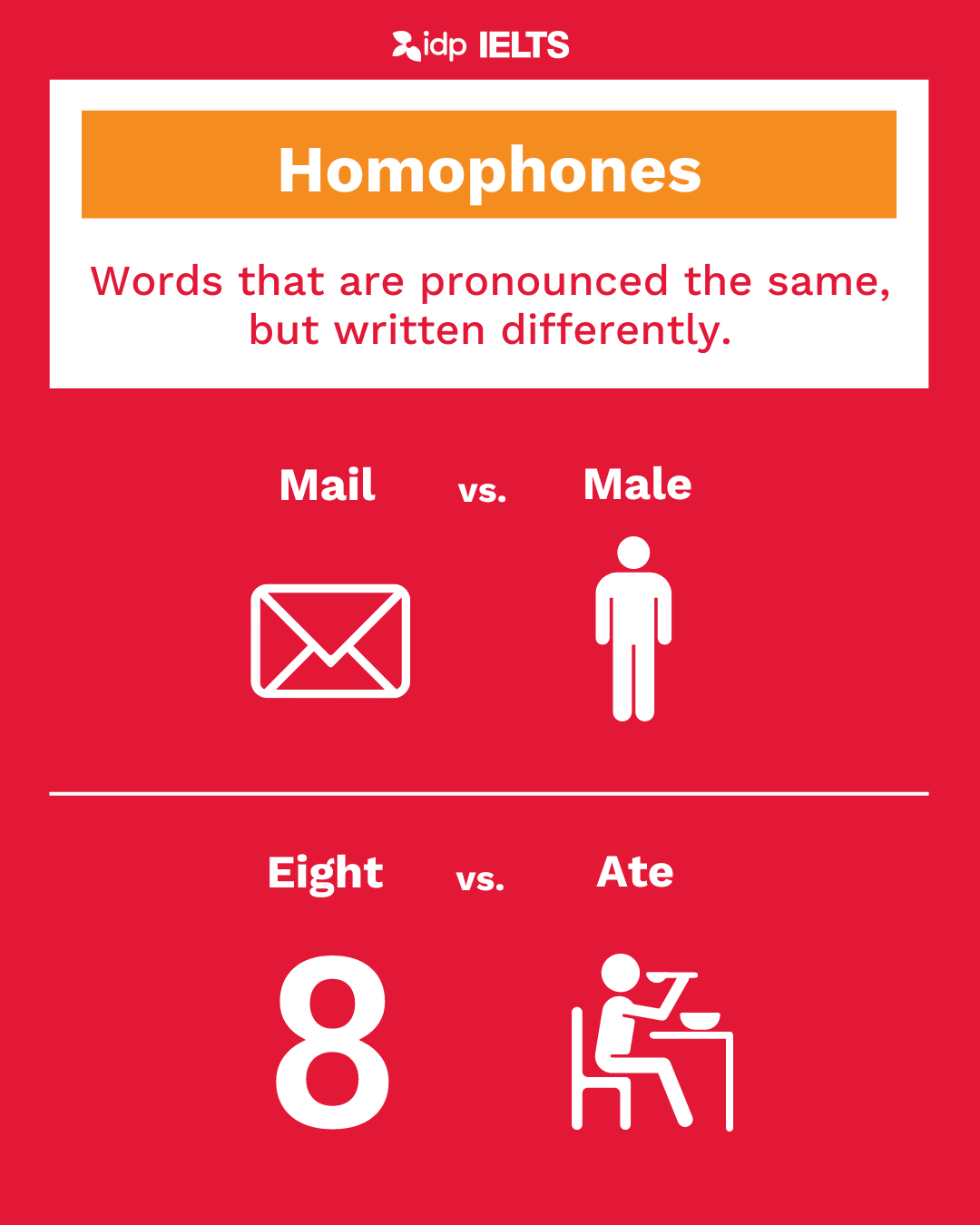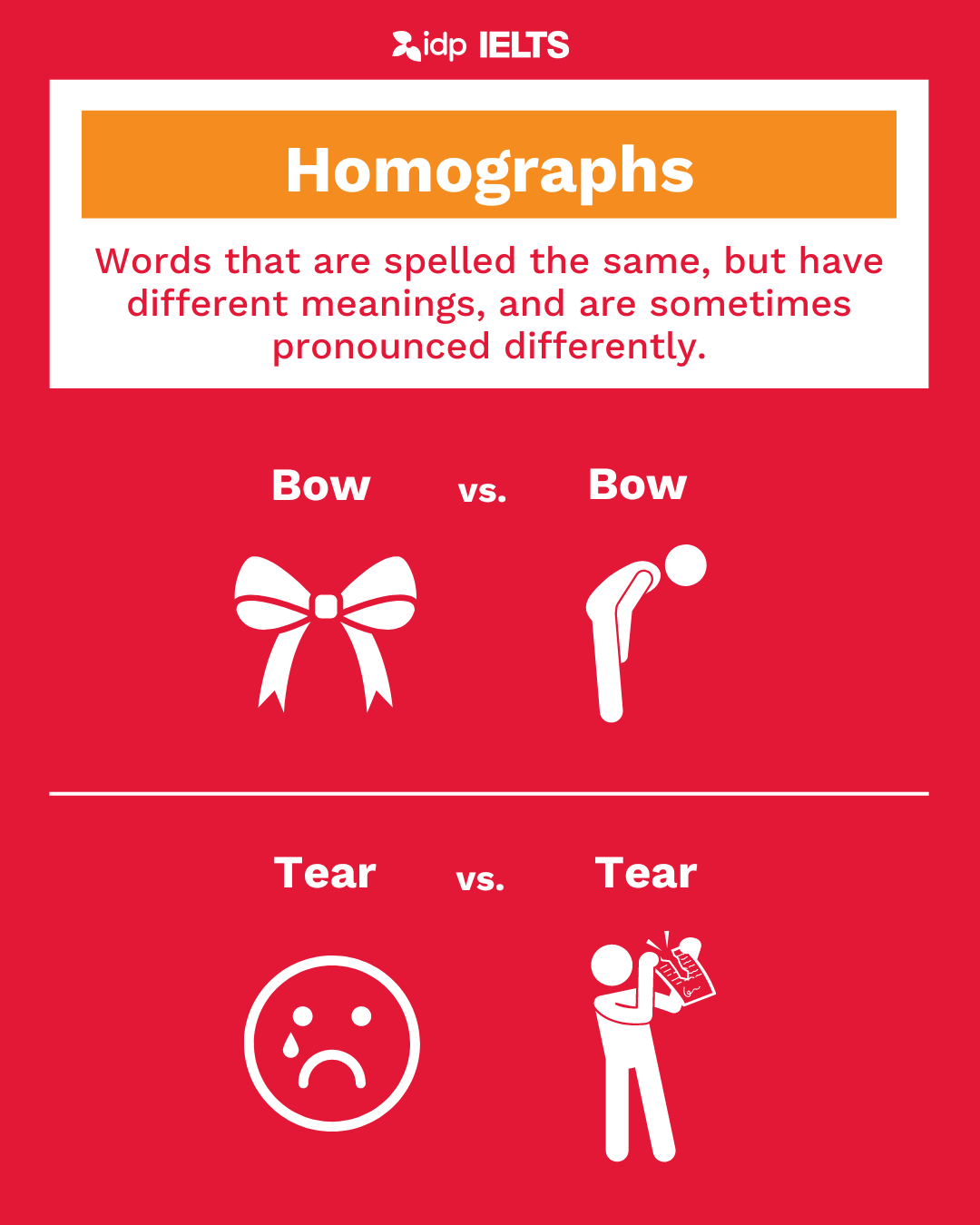In written English (for example in your IELTS Writing test), it is important to know the correct spelling of a word you want to use. You don’t want to write “weak” when you mean “week” even though they sound the same. In spoken English, (your IELTS Speaking test for example), spelling is less important, but pronunciation is. Think about the word “lead” which can be pronounced as “led” or “leed.” Because these words cause a lot of confusion, it’s well worth spending a few minutes to understand the difference: homophones vs homographs vs homonyms. So what do these words mean?
Homonyms
Homonyms are words which sound alike or are spelled alike but have different meanings.
In a strict sense, a homonym is a word that both sounds and is spelled the same as another word. Think of the word “lie” which can mean “not true” or “horizontal or resting position.” They are written and pronounced the same. Likewise, “train” is a mode of transport or could mean physical/mental exercise.
In loose terms, both homographs and homophones are a kind of homonym because they either sound the same (homophone) or are spelled the same (homograph).
Homophones
What is a homophone?
The word homophone comes from the Greek word homos (=same) and phone (=voice).
Homophones can be words that sound the same but have different meanings.
List of homophones
Try to read the following words aloud and then look at their meaning. They should sound identical but have different meanings.
ad (advertisement) / add (increase)
ate (past tense of eat) / eight (number 8)
be (verb) / bee (the yellow/black flying animal)
blew (past tense of blow) / blue (the colour)
buy (purchasing) / by (proposition or adverb) / bye (farewell)
cell (small room where a prisoner is kept) / sell (hand over in exchange for money)
hear (listening to something) / here (in, at, or to this place or position)
hour (time) / our (something that belongs to you and others)
its (belonging to or associated with a thing) / it’s (contraction of “it is”)
know (knowing something) / no (opposite of yes)
meet (getting together with someone) / meat (animal product as food)
one (number 1) / won (past tense of win)
their (belonging to or associated with people) / there (here or nearby) / they’re (contraction of they are)
theirs (belonging to or associated with people) / there’s (contraction of there is)
to (motion or direction) / too (as well or in addition) / two (number 2)
who’s (contraction of who is or who has) / whose (belonging to or associated with which person)
your (belonging to or associated with which person) / you’re (contraction of you are)
Examples of homophones in a sentence
Let’s take a couple of words from the list provided above and put them in a sentence. As an exercise, you could try to put the other words in a sentence.
Hour/our
The appointment at the dentist will take about one hour.
Our house was built 20 years ago.
Bye/by
“Are you leaving already?” … “Yes, I need to catch the train. Bye!”
You need to be in class by 1pm at the latest.
To/too/two
I have to go to the dentist.
Do you want me to come too?
If there are two of us, we should take the car.

Homographs
What is a homograph
The word homograph comes from the Greek word homos (=same) and grapho (=write).
Homographs are words that are written/spelled the same but have different meanings and are sometimes pronounced (how we say words) differently.
When the words are the same for a noun and a verb, the pronunciation is often just a shift in the stressed syllable, from the first syllable (noun) to the last syllable (verb). For example, record/noun, to record/verb.
List of homographs
Try to read the following words aloud when you look at their meaning. Even though they are spelled the same, some of them sound different.
Content (/kənˈtent/)
Con-TENT = happy or satisfied (adjective)
CON-tent = all that is contained inside something (noun)
Desert (/dezət/)
DE-sert = a hot, arid region (noun)
DEE-sert = to leave (verb)
Does (/dʌz/)
DOSE = female deer (plural)/present (noun)
Does = third person singular form of the verb “do” (verb)
Evening (/iːvn̩ɪŋ/)
Eav-ning = late afternoon (noun)
Ev-en-ing = making more even (verb)
Minute (/maɪˈnjuːt/)
Min-ut = 60 seconds (noun)
My-nute = extremely small (adjective)
Read (/riːd/)
Red = past tense of reading (verb)
Reed = present tense of reading (verb)
Present (/prɪˈzent/)
PRE-sent = at this moment or right now/a gift (noun)
Pre-SENT = to give something to someone (verb)
Permit (/pəˈmɪt/)
Per-MIT = Give permission (verb)
PER-mit = Official document (noun)
Examples of homographs in a sentence
Let’s take a couple of homographs and put them in a sentence. As an exercise, you could try to put the other words from the list above, into a sentence.
I drove down the windy (wine-dy) road on a windy (win-dy) day.
She will read (reed) the book that her older sister read (red) last year.
I’d like to present (pre-SENT) you with a birthday present (PRE-sent).
I wanted to record (re-CORD) the record (REC-ord) on my device.

How to avoid mistakes in your IELTS test?
When you are preparing for your IELTS Speaking test, it is important to understand how a word is pronounced because this is assessed in the marking criteria.
For your IELTS Speaking test, you need to make sure you pronounce (say) words correctly. Let’s take a look at this example: If you are asked during your Speaking test to tell the examiner about a time that made you happy, it is always good to use a variety of words. Instead of happy, you can say “joyous,” “cheerful,” or “content.” However, you should be careful to pronounce the words correctly. You don’t want to say CON-tent (which means “all that is contained inside something”) instead of con-TENT (which means “happy” or “satisfied”).
If you want to practise your Speaking test with an official IELTS Expert, you could consider IELTS Assist. You will do a mock Speaking test and receive feedback on your performance.
Ready to book your IELTS test? Find a test centre near you.
IELTS by IDP app
Book, prepare, and preview your results all in one place. Download the IELTS by IDP app today!
